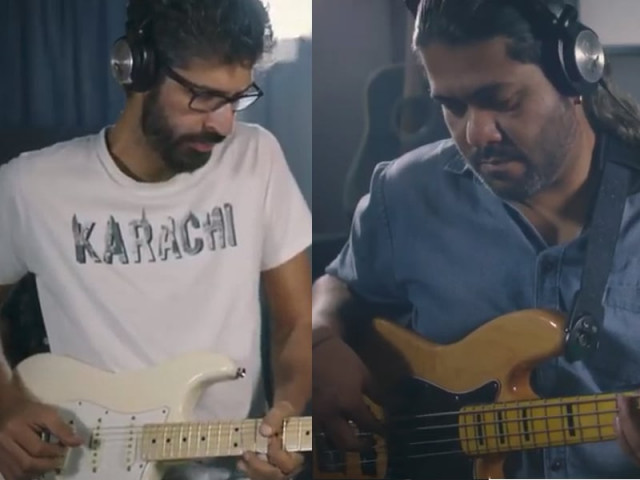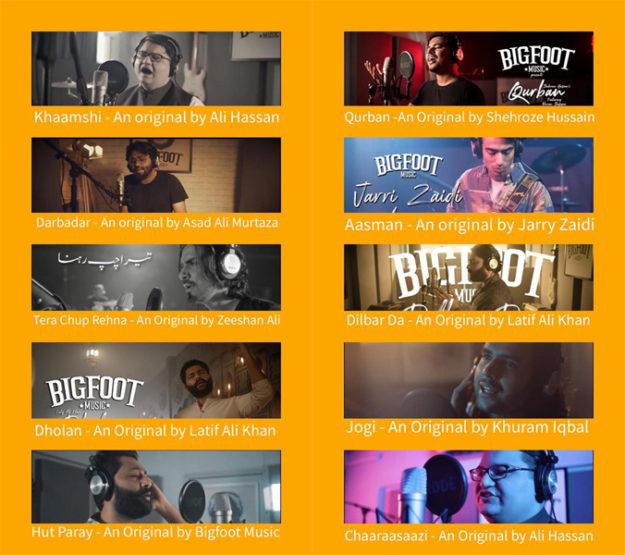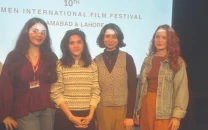Bigfoot Music is helping Pakistani artists produce original songs for free
Studio cum YouTube channel has managed to release 16 original music videos in 8 months, without any corporate backing

Bigfoot Music is helping Pakistani artists produce original songs for free
“Our industry lacks original music,” Lari tells The Express Tribune as he takes a sip of tea. “We are not interested in covers; everyone is doing them. We are looking for artists who have found their own rhythm so that we can make others groove to it.”
As we speak, Chand Tara Orchestra is tracking their song inside the recording space visible through a small glass window. Lari has his ears on the recording. Several buds fill the ashtray on the side table, tantamount to the number of people who have eased into the cushy room today. This is the small yet significant empire of Lari and Khan, where they collaborate with various artists in hopes to land a ‘big foot’ into Pakistan's music scene.
“Bigfoot started in March,” recalls Lari. “We were looking to produce artists with original songs without charging them a penny. We found some of them and the others found us, but we didn't entertain half-baked ideas with no sense of originality.”

Staying true to their promise, Bigfoot has managed to release 16 original songs along with their music videos since March. That makes two original songs a month.
Khan, on the other hand, thinks there is a serious issue with the current generation of musicians and that is entirely the fault of those before them. “They only want to make covers with better sound because that's all they’ve heard. Yes, original music is being produced, but much of the hidden talent lies where investments are limited and the playing requires polishing.”
Recently, they released Jogi with Khurram Iqbal, who is also the lead singer of Fuzon. It’s a funky track fused with eastern-classical. “Not once did we resist before saying yes to this song. We even played the guitar, keys and bass on it,” the duo reveals.
While its portfolio is indeed original and a step in the right direction for the music scene at large, Bigfoot has been blamed for producing the artists Khan and Lari hang out with. “Having a certain preference or taste in music does not mean there is nepotism involved,” they clarify. Lari recalls how a friend once came to him with a rock track that echoed of the early-mid 2000s rock scene. “It was funky but it was not today’s music, so we didn’t produce it.”
Ik Wari vocalist Zeeshan Ali hesitantly sits down before steering into a series of compliments for the producers. The singer had landed his debut in Nescafe Basement with the song Tere Jeya Hor Disda. According to him, people only knew him for that cover song before he met Lari and Khan. “Now people know me for my own tracks and it feels good.”
Ali feels it’s really important for other production houses to stop exploiting artists for money or forcing them into creating something that is pre-packaged and sellable. “I know at least 200 people in Lahore who make original music but have no means to produce it,” he says.
Khan explains how Bigfoot is in fact a product of their own struggles as underground musicians, which is why they don't believe in treating musicians like clients. But if the vacuum created by cover songs is to be filled properly, there need to be more such ventures.
“One place cannot provide everything and it’s good to set some limits,” says Khan. “We produced a song called Seaside with Saifur Rehman, an amazing song-writer who randomly landed in our studio. It’s the only English track we’ve done so far and it’s very different from the rest.”
In contrast, Khan says the ghazal with Ali, titled Tera Chup Rehna, which he played in their little sanctum, is the simplest music they have produced so far. “What makes sound mature is not the layers of technology applied to it, nor the kind of shredding, or the number of instruments. What makes music mature is the way it is composed. There could be three chords but if they sound encapsulating, that’s your eureka moment!” says Lari.
The duo promises to carry on the experiments and keep their doors open for more original content. There are, however, a few no-go areas for them. “We are open to ideas, but see…we won’t call ourselves electronic music producers. We are organic music producers; we record instruments live,” shares Lari. Khan adds, “I have another perspective on this. If Nusrat Fateh Ali Khan made a song, can you make it better than him? If you can, then do it. Otherwise, don’t over-complicate and ruin it. We had a rock band ourselves, but if a particular genre of music is not heard, then it is not understood. It will be unjustified for the musician.”
Have something to add to the story? Share in the comments below.



















COMMENTS
Comments are moderated and generally will be posted if they are on-topic and not abusive.
For more information, please see our Comments FAQ